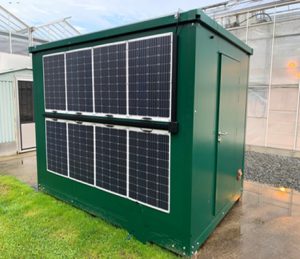EIRA supports collaboration for off-grid DC based LED lit vertical farming systems
Plant Raisers Ltd, are the largest propagator of glasshouse salad crops in the UK. With a recent expansion of its conventional glasshouse facility, Plant Raisers Ltd partnered up with their sister company IGrowing Ltd to develop a system to produce seedlings using an off-grid LED lit vertical farming facility.

iGrowing, located in East Yorkshire, is a leading supplier of indoor vertical farming systems for the UK and has a significant proportion of their customer base in the East of England using ultra-low energy LED lighting solutions.
Using a soil free hydroponic system means crops can grow under any given climate conditions and can maximise crop growth and increase yield, enabling a variety of markets to grow safe, healthy and nutritious plants and food indoors using vertical structures.
Vertical hydroponic farming systems help to maximise space for better performance, reducing both production costs and carbon emissions.
iGrowing and Writtle University College were awarded an EIRA Research & Development Grant to conduct vital research for the further development of their DC based LED lit growing systems prototype in support of its market launch.
The Challenge
Approximately 77% of UK salad vegetable consumption (by weight) is imported, incurring considerable food miles and inevitable reduction is shelf-life and quality. Significant market opportunities exist in the UK protected horticulture sector to radically change and increase locally-grown crop production systems to ensure long-term sustainability of all year-round UK salad and vegetable crops and reduce dependence on imported products, generating both economic and environmental benefits.
The current AC based LED lighting systems for crop production, in glasshouses and controlled environments or vertical farms, are becoming more commonplace. However, their wider uptake is hampered by cost effectiveness in terms of capital outlay and high running costs, and this in turn is deterring investment in the technology.
The opportunity for sustainable, economically viable crop production offers considerable market opportunities for a DC based growing system particularly as the current state-of-the-art AC LED growing systems remain energy intensive, largely due to the excess heat and climate management costs required.
A DC based prototype was designed by iGrowing to eliminate the carbon footprint associated with vertical farming and maximise the yield of seedlings per unit of electricity. In order to achieve this concept, the DC based prototype growing system would need to produce similar or better crops within the same growing time-frame, while using 30 – 40% less energy allowing the potential use of renewable or sustainable energy sources such as solar PV panels.
The Approach
The project was overseen by the lead academic Dr. Kambiz Baghalian, Senior Lecturer in Crop Production and MSc Course Manager at Writtle University College, who was responsible for overall project coordination and trial design and delivery. The project was also supported by Liam King, a technician to help with the management of growing cabin and Professor Tracy Lawson, who is a leading international expert in plant science and is a Director of the Plant Physiology lab at the University of Essex. Prof. Lawson helped to support the validation process and provided her expertise and insights for the interim and final reporting stages.
Two prototypes were installed on the Writtle University site. One was the iGrowing DC prototype and the second one was an identical growing unit but built on the current off-the-shelf technology. Two types of crop were cultivated. The first was lettuce as a short fast growing crop, and the second was dwarf tomatoes as these are a relatively long season growing crop. Both crops were grown within the units and physiological data as well as energy consumption were collected for both units.

The Outcome
After the trial was finished statistical analysis was carried out to compare the two units’ efficiency and in comparison with the AC unit, the DC unit showed no shortcoming in terms of plant physiology and crop yield. In terms of the energy consumption, the DC unit showed 40% energy efficiency compared to AC and thereby achieved their project goal.
Next Steps
The total energy demand of the container system is now so low that it can support off grid production with power provided by locally mounted solar panels and/or a small scale wind turbine with a standby gas generator available as an optional extra.
Eliminating this waste energy has allowed the parasitic loads associated with heat management to be negated saving energy and unnecessary capital cost and making off grid operation a reality.
The next phase of this project will be to equip a new, off-grid cooling technology to the DC unit and test its efficiency to the test AC unit in support of its market launch.
Contact for any queries
Dr. Kambiz Baghalian – Senior Lecturer in Crop Production and MSc Course Manager, Writtle University College
